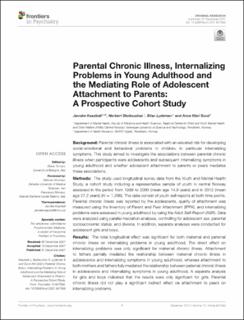| dc.contributor.author | Kaasbøll, Jannike | |
| dc.contributor.author | Skokauskas, Norbert | |
| dc.contributor.author | Lydersen, Stian | |
| dc.contributor.author | Sund, Anne Mari | |
| dc.date.accessioned | 2022-02-04T08:10:41Z | |
| dc.date.available | 2022-02-04T08:10:41Z | |
| dc.date.created | 2021-12-17T08:34:49Z | |
| dc.date.issued | 2021 | |
| dc.identifier.citation | Frontiers in Psychiatry. 2021, 12 1-12. | en_US |
| dc.identifier.issn | 1664-0640 | |
| dc.identifier.uri | https://hdl.handle.net/11250/2977033 | |
| dc.description.abstract | Background: Parental chronic illness is associated with an elevated risk for developing social-emotional and behavioral problems in children, in particular internalizing symptoms. This study aimed to investigate the associations between parental chronic illness when participants were adolescents and subsequent internalizing symptoms in young adulthood and whether adolescent attachment to parents or peers mediates these associations.
Methods: The study used longitudinal survey data from the Youth and Mental Health Study, a cohort study including a representative sample of youth in central Norway assessed in the period from 1999 to 2000 (mean age 14.9 years) and in 2012 (mean age 27.2 years) (N = 1,266). The data consist of youth self-reports at both time points. Parental chronic illness was reported by the adolescents, quality of attachment was measured using the Inventory of Parent and Peer Attachment (IPPA), and internalizing problems were assessed in young adulthood by using the Adult Self-Report (ASR). Data were analyzed using parallel mediation analyses, controlling for adolescent sex, parental socioeconomic status, and divorce. In addition, separate analyses were conducted for adolescent girls and boys.
Results: The total longitudinal effect was significant for both maternal and paternal chronic illness on internalizing problems in young adulthood. The direct effect on internalizing problems was only significant for maternal chronic illness. Attachment to fathers partially mediated the relationship between maternal chronic illness in adolescence and internalizing symptoms in young adulthood, whereas attachment to both mothers and fathers fully mediated the relationship between paternal chronic illness in adolescence and internalizing symptoms in young adulthood. A separate analysis for girls and boys indicated that the results were only significant for girls. Parental chronic illness did not play a significant indirect effect via attachment to peers on internalizing problems.
Conclusions: Identifying protective factors in the pathways between parental chronic illness and mental distress in children could guide measures that promote the well-being of the child and family. The study demonstrates the importance of targeting the entire family in chronic illness care. | en_US |
| dc.language.iso | eng | en_US |
| dc.publisher | Frontiers | en_US |
| dc.rights | Navngivelse 4.0 Internasjonal | * |
| dc.rights.uri | http://creativecommons.org/licenses/by/4.0/deed.no | * |
| dc.title | Parental chronic illness, internalizing problems in young adulthood and the mediating role of adolescent attachment to parents: A prospective cohort study | en_US |
| dc.type | Peer reviewed | en_US |
| dc.type | Journal article | en_US |
| dc.description.version | publishedVersion | en_US |
| dc.source.pagenumber | 1-12 | en_US |
| dc.source.volume | 12 | en_US |
| dc.source.journal | Frontiers in Psychiatry | en_US |
| dc.identifier.doi | 10.3389/fpsyt.2021.807563 | |
| dc.identifier.cristin | 1969696 | |
| cristin.ispublished | true | |
| cristin.fulltext | original | |
| cristin.qualitycode | 1 | |

